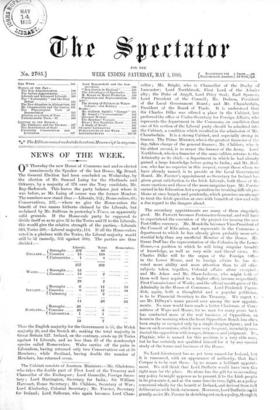The secondary appointments are many of them singularly good. Mr.
Fawcett becomes Postmaster-General, and will have to superintend the execution of the project for issuing the new Post-Office currency. Mr. Mundella becomes Vice-President of the Council of Education, and represents in the Commons is department to which he has already given probably more sub- stantial help than any unofficial Member of the House. Mr. Grant Duff has the representation of the Colonies in the Lower House,—a position to which he will bring singular breadth of knowledge, as well as very wide and liberal views. Sir Charles Dilke will be the organ of the Foreign Office in the Lower House, and to foreign affairs Ile has de- voted more ability and more attention than to all other subjects taken together, Colonial affairs alone excepted ; and Mr. Adam and Mr. Shaw-Lefevre, who might both of. them well have aspired to a higher office, become respectively First Commissioner of Works, and the official mouth-piece of the Admiralty in the House of Commons. Lord Frederick Caven- dish, again, both a thoughtful and a popular politician, is to be Financial Secretary to the Treasury. We regret t., see Mr. Dillwyn's name passed over among the new appoint- ments. No man would have made a better Chairman of Com- mittees of Ways and Means, for no man for many years back has conducted more of the real business of Opposition, at horn-sin the morning when the front Opposition Bench has often. been empty or occupied only by a single sleeping figure ; and he has on such occasions, which were very frequent, invariably con- ducted the opposition with temper, firmness, and judgment. Dr.. Playfair, who is named for this position, is a very able man, but he has certainly not qualified himself for it by any special study of the forms and business of the House.


































